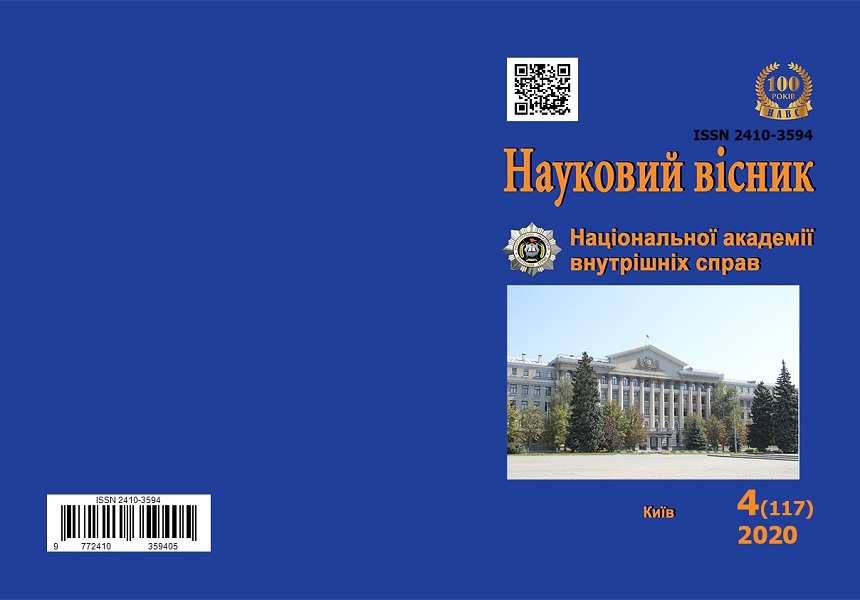Analysis of Sanctions of Article 44-3 of the Code of Ukraine on Administrative Offenses
Abstract
The purpose of the article is to identify the main shortcomings of administrative penalty for violating rules on quarantine of people (Article 44-3 of the Code of Ukraine on Administrative Offenses) in order to define scientifically sound ways to eliminate them. The article uses a set of scientific methods, namely: terminological, system-structural, formal-logical, comparative-legal. The theoretical basis of the study consists of works of Ukrainian and foreign scholars, the provisions of the Code of Ukraine on Administrative Offenses, as well as the practice of their application. The scientific novelty of the article is that it revealed a number of defects that characterize sanctions of Art. 44-3 the Code of Administrative Offenses. This made it possible to suggest proposals for their elimination by reducing the minimum and maximum penalty in the form of fine for violation of the rules on quarantine of people, harmonization of the limits of sanctions under Art. 44-3 of the Code of Ukraine on Administrative Offenses and Art. 325 of the Criminal Code of Ukraine, as well as expanding limits of sanctions under Art. 44-3 of the Code of Ukraine on Administrative Offenses due to the introduction of alternative penalties in the form of warning and administrative house arrest. Conclusions. 1. The excessive severity of fines for certain categories of citizens, the sanction’s non-alternative nature, lack of proper differentiation of administrative responsibility for offenses under Art. 44-3 of the Code of Administrative Offenses, as well as the proximity of penalty provided by Art. 44-3 the Code of Administrative Offenses to sizes of the punishments provided by Art. 325 of the Criminal Code of Ukraine are main shortcomings of sanctions of Art. 44-3 of the Code of Ukraine on Administrative Offenses. 2. Optimization of sanctions of Art. 44-3 of the Code of Ukraine on Administrative Offenses is possible through reduction of the minimum and maximum fine, coordination of its limits with sanctions of Art. 325 of the Criminal Code of Ukraine, as well as expanding the limits of sanctions under Art. 44-3 of the Code of Ukraine on Administrative Offenses by introduction of warning and administrative house arrest. 3. The advantages of such steps for Ukraine as a rule of law of European standard nave been outlined: a) reduction of public dissatisfaction with parliament and law enforcement agencies; b) achieving the balance between measures of administrative and criminal responsibility; c) enabling judges to take more reasonable, lawful and fair measures to respond to commission of an administrative offense under Art. 44-3 the Code of Ukraine on Administrative Offenses.
Keywords: administrative liability; quarantine; coronavirus; administrative offense; administrative penalties; infectious diseases; rules on quarantine of people.
Downloads
References
Ковальова С. С. Відповідальність за порушення карантину та санітарних правил і норм щодо запобігання поширенню коронавірусної інфекції (COVID-19) в Україні. Право. Людина. Довкілля. 2020. № 11 (2). С. 158–168. doi: https://doi.org/10.31548/law2020.02.019.
Крикун В. В. Об’єктивні особливості адміністративних правопорушень, передбачених статтею 443 Кодексу України про адміністративні правопорушення та їх вплив на сферу повноважень Національної поліції України. Вісник Харківського національного університету внутрішніх справ. 2020. № 89 (2). С. 153–163. doi: https://doi.org/10.32631/v.2020.2.15.
Курінний Є. В. Про аксіологічну сутність адміністративних штрафів. Вісник Запорізького національного університету. 2020. № 1. С. 144–150. doi: https://doi.org/10.26661/2616-9444-2020-1-22.
Кузембаєв О. С. Кримінальна відповідальність за зараження коронавірусом SARS-CoV-2 (COVID-19) в Україні та деяких зарубіжних країнах в ракурсі економічного паритету. Вісник асоціації кримінального права України. 2020. № 1 (13). С. 75–91. doi: https://doi.org/10.21564/2311-9640.2020.13.2028.
Маслак О. В., Рєзнік О. М. Проблемні аспекти системи адміністративних стягнень в Україні. Юридичний науковий електронний журнал. 2019. № 4. С. 131–134. doi: https://doi.org/10.32782/2524-0374/2019-4/35.
Новицька М. В. Ступінь суспільної небезпеки як одна із основних ознак адміністративних правопорушень. Правові новели. 2020. № 11. С. 204–211. doi: https://doi.org/10.32847/ln.2020.11.26.
Пилипів Р., Тимчишин А. Адміністративна відповідальність за порушення правил щодо карантину людей: проблеми та перспективи. Юридичний вісник. 2020. № 3. C. 163–169. doi: https://doi.org/10.32837/yuv.v0i3.1937.
Рєзнік О. М., Полянська Є. А. Відповідальність за порушення карантинних заходів: національний і зарубіжний досвід. Правові новели. 2020. № 11. С. 218–224. doi: https://doi.org/10.32847/ln.2020.11.28.
Роговська Я. І., Козін С. М. Штрафи та адміністративна відповідальність при порушенні умов карантину. Збірник наукових праць ΛΌГOΣ. 2020. С. 82–83. doi: https://doi.org/10.36074/24.04.2020.v5.29.
Самбор М. А. Склад адміністративного правопорушення щодо порушення правил карантину людей. Вісник Луганського державного університету внутрішніх справ імені Е. О. Дідоренка. 2020. № 2 (90). С. 155–170. doi: 10.33766/2524-0323.90.155-170.
Вознюк А., Чернявський С. Порушення правил і норм щодо запобігання COVID-19: актуальні проблеми кримінальної та адміністративної відповідальності. Юридичний часопис Національної академії внутрішніх справ. 2020. № 19 (1). С. 8–19. doi: https://doi.org/10.33270/04201901.8
Про внесення змін до деяких законодавчих актів України, спрямованих на запобігання виникненню і поширенню коронавірусної хвороби (COVID-19) : Закон України від 17 берез. 2020 р. № 530-IX. URL: https://zakon.rada.gov.ua/laws/show/530-20#n22.
Abstract views: 151 PDF Downloads: 298
- Authors reserve the right to authorship of their own work and transfer to the magazine the right of the first publication of this work under the terms of the Creative Commons Attribution License, which allows other persons to freely distribute published work with mandatory reference to authors of the original work and the first publication of an article in this magazine.
- Authors have the right to enter into separate additional agreements on non-exclusive dissemination of the work in the form in which it was published in the journal (for example, to post an article in the institution's repository or to publish as part of a monograph), provided that the link to the first publication of the work in this journal is maintained.
- The journal's policy allows and encourages the posting of articles by authors on the Internet (for example, in electronic storehouses of institutions or on personal websites), both before the submission of this manuscript to the editorial office and during its editorial processing, as this contributes to the creation of a productive scientific discussion and positively affects the efficiency and dynamics of citing the published work.




